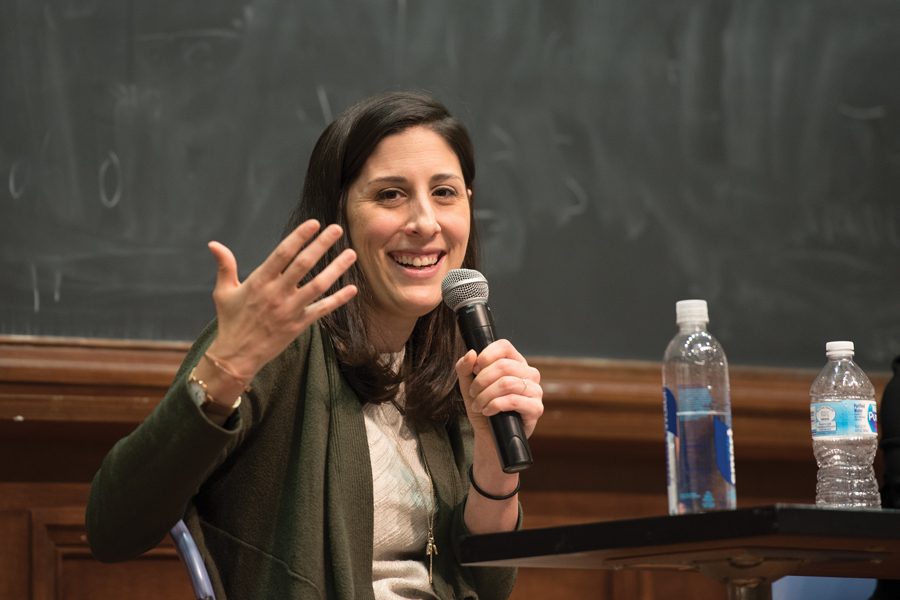Sarah Kliff talks healthcare reporting, Democratic platform for 2020
Zoe Malin / The Daily Northwestern
Vox correspondent Sarah Kliff speaks at an event Wednesday. Kliff discussed her experience reporting on Affordable Care Act recipients that voted for Trump.
November 15, 2018
Nearly a decade after journalist Sarah Kliff moved into healthcare reporting during the passage of the Affordable Care Act, she is covering the beginnings of a new era of the political fight over healthcare.
The senior correspondent at Vox spoke during a moderated talk with Medill Prof. Abigail Foerstner about her career, current developments in healthcare and her perspective on the current political situation surrounding it to a crowd of about 100 in Harris Hall.
Kliff, who has previously written for Politico and the Washington Post, transferred to work as Newsweek’s assistant political editor in the run-up to the 2008 presidential election.
No serious candidates ran on a Medicare-for-all platform in 2008, she said. Looking at 2020’s candidates, she was stunned by the fact that the party platform seems to have changed entirely, with many major contenders supporting Medicare-for-all.
“It really feels to me like a result of the Obamacare repeal debate, where Democrats kind of saw the Affordable Care Act as a compromise,” Kliff said. “Now that they’ve seen Republicans don’t want to get on board with Obamacare, it feels almost like… we’re going to go for the healthcare system we actually wanted this whole time. So I see a lot of momentum towards refining what does Medicare-for-all looks like.”
From insurance to drug prices to the opioid epidemic, Kliff, who hosts Vox podcasts “The Weeds” and “The Impact,” talked about the unique perspective she gained from on-the-ground interviews with doctors and patients across the nation. She said she found that doctors held diverse opinions on widening Medicaid and that many voters in Democratic areas were, contrary to her expectations, supportive of Medicaid work requirements.
She discussed a 2016 story about Obamacare enrollees who voted for President Donald Trump. Most of her interviewees understood that their coverage was part of the Affordable Care Act, but they were won over by Trump’s promises of better healthcare plans.
“I talk to people who say, ‘I feel like I keep paying and paying money beyond my premiums, and I’m not getting very good care as a result,'” Kliff said. “So when President Trump said, ‘I’m going to do something better,’ they were already primed to want that thing that’s better.”
As for the future of healthcare policy, Kliff spoke about the Republican party’s lack of unity on healthcare and the Democratic party’s new focus. While Democrats work toward new ways to expand coverage, Republicans have “worked themselves into a corner” with a focus on deregulation of health insurance which has become unsavory in the face of increased acceptance of preexisting condition coverage, she said.
“There’s less people working in this space, coming up with interesting ideas, so you just kind of have less policy innovation on the right,” Kliff said. “I haven’t seen a new Republican consensus on, ‘Okay, what do we want our healthcare system to look like.’ And when they get close to consensus, it just turns out the vision they have is not that popular and it just isn’t able to unify the party enough to pass anything through Congress.”
Medill graduate student Jillian Melero, who specializes in Health, Environment and Science, said she was happy that Kliff was afforded the time to go in depth.
“I’m familiar with Vox, but Sarah’s coverage I’ve only become familiar with within the last year or so,” Melero said. “I subscribe to the newsletter and I subscribe to the Facebook group so it was just nice to have the opportunity to see her in person.”
Email: avivarghese2022@u.northwestern.edu
Twitter: @avi_vrghs



